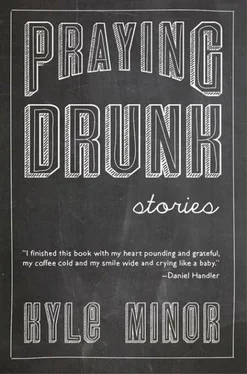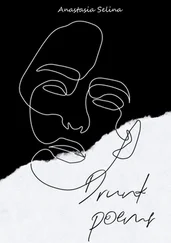There is nothing but sadness in Nashville, except maybe this one thing we both can say but don’t say aloud: My brother loves me, and I love my brother. No more deaths, I don’t say. No more suicides. Not me, not you, not anybody we know. No more thefts. No more drugs. No more embezzlements. No more phone calls. No more trouble with women. No more deaths. All night we lie fifteen inches apart on the beanbag chairs and don’t say anything at all. I want both of us to be all right. I want all of us to live forever.
WHITE ENAMEL SET INTO PINK MOLD-INJECTED PLASTIC, set on the table next to the hospital bed, and he says, “Gin”—that’s my mom, his daughter—“can you get me some of those white strips?” because he’s worried his teeth have yellowed.
At issue is the nurse, the pretty young brunette who has been taking the teeth out, at my grandmother’s request, and putting them back in, when she leaves, at my grandfather’s request. The old man is shameless as regards the pretty girls. He asks me if I saw the pretty nurse, and I say yes, and he says, “She’s right purty,” and I agree, and I know he’s wishing my little brother was here instead of me, because they have that in common, the eye for the ladies, the dwelling eye.
“He’s coming,” I say, “in two days. He’s flying in from Nashville as soon as he can wrap things up at work.”
“Why is he coming?” my grandfather says, and I know right away what he means. He means, Am I going to die? Is that why you’re here, flown to Florida from Ohio?
“He’s coming to see you,” I say, and not because we don’t both know what’s happening, not because I’m humoring him, but because my mother is in the room, and I can’t say what he wants me to say and what I want and don’t want to say, which is: He’s coming to see you before you die. He’s coming to see you because he loves you, because he’s your favorite and you’re his favorite .
My mother is in the room and she can’t bear to hear things like that. She’s not given to much truth-telling, not out loud. She likes to keep things nice, and for all these years I’ve thought she was wrong, but not today. Nobody knows one right thing to say, and neither does she, but she knows how to stand at the edge of the bed, right up near her father’s head, and touch him, and put her face close to his. She knows to say, “I forgave you a long time ago,” when he says he’s sorry for all the things he’s done to her, and she knows not to make a list, not to catalogue the times he pulled the curtains off the wall or threw sharp kitchen utensils in drunken rages or let wild men into the house where his daughters slept at two in the morning. She knows not to mention all the horrible women he met at honkytonks, or the beatings he gave her older brother and sister, or the way he made my grandmother so angry she’s still trying to get even, even now, fifteen years after everything got calm and easy for the first time since they were too young to be married and got married anyway.
“Why is he coming?” my grandfather says, again.
“You can understand what he’s saying?” my mother says, to me.
“Yes,” I say.
“It’s because he doesn’t have his teeth in,” my father says. “Bill, do you want your teeth in?”
He nods his head, says yes.
But no one knows how to put his teeth in. There is a tube of adhesive by the bed. I think maybe I’ll try to put his teeth in. A volunteer summons my parents to the waiting room on the other end of the floor to consult with the doctor. My mother says I should go get the nurse, so I leave the room and go looking, but she’s somewhere else, maybe taking a break, or taking someone to the bathroom.
I have my mother’s cell phone in my pocket, call my wife in Ohio and tell her about the teeth, and she says, “You have to put them in. You have to just do it.”
“I don’t know how,” I say, and it’s true. But it’s also true that I don’t want to do it. I’ve been touching him on his chest, and sometimes he’s been grabbing my hands, and my face has been so close to his face that I’ve been taking the full stench of his decaying organs into my nostrils every time he exhales. One time I was walking in the woods and came upon a pile of dead opossums, killed by something bigger and left for some reason I don’t know. Every time he exhales I can smell those dead opossums times ten or maybe twenty, a truly noxious odor I don’t know anything to do about and can’t turn away from out of shame at showing any sort of embarrassment or weakness or, really (to be honest), selfishness.
My wife is not having my protests. “You just put some paste on the plates and stick them up on his gums where teeth go.”
“I don’t know where to put the paste,” I say.
“On the plates,” she says.
“I don’t know how much,” I say. “I don’t know where. Two dabs or three? Or spread all around? I don’t know. I don’t want to mess up his mouth. Or his breathing. He’s having trouble breathing.”
Every second or third exhalation, a gurgling sound comes from deep in his body. It’s so vulgar, but it’s what I’m thinking: He’s drowning in his own juices.
I see the nurse and know the nurse will save me.
“I found the nurse,” I say.
“It’s good for you,” my wife says. “It’s good for all of you to do as much of the physical care for him as you can. Don’t just let the nurse do everything.”
“Okay,” I say, and then I hang up and get the nurse.
He flirts with her when she comes in, and she flirts back, and this flirting has made my mother crazy for as long as I can remember, but now it’s a good thing, everyone in the room recognizes it’s a good thing. It’s a sign of fight, and it’s something characteristic, and everything characteristic has become suddenly dear.
The nurse holds up the adhesive tube and asks if it’s the right paste, and he says yes, and she fills the dental plate with adhesive, and I can tell by his eyes that it’s too much paste, but he doesn’t say anything because she’s the pretty nurse.
She pushes the upper plate into his mouth, and the paste fills the gap between gum and plate and begins to spill over the sides and out the back of the dentures. Some of it drips down into his throat, and he begins gagging, and the gurgling starts to get worse, and still she keeps pushing the plate against his gums, not stopping until he begins to cough convulsively. Then she yanks the teeth out of his mouth and replaces them with gauze to wipe up the extra paste.
I watch her and wonder how many times she’s taken his teeth out and put them back in, and why can’t she get it right?
She is apologizing, and my mother and father have left the room to consult with the doctor, and my grandfather is gagging and wheezing and can’t respond, so now she is apologizing to me.
“How many times have you done this before?” I ask her.
“It’s just there’s so many patients,” she says. “They all like it different ways. It’s hard to keep straight.”
She wipes the paste from the plate with fresh gauze, then holds the dentures out to my grandfather and asks him if he’d like to do it.
He reaches for the teeth, and his hands are shaking, but not so violently as they begin to shake when he takes the teeth in his hands.
The teeth must weigh a few ounces, maybe five or six if they’re heavy. It is a measure of how weak he is that so little weight registers at all.
He transfers the teeth into his left hand and asks me to squeeze the paste onto the plates. I ask the nurse if she will do it, and he scowls at me, as if to say, She’s the one who screwed it up in the first place . He lets her do it, though, and she says, “Where?” and he points with one shaking finger to the middle, right behind the front teeth, and says, “Pea-size,” but she doesn’t understand his words without his teeth in, and I have to translate. “Pea-size,” I say.
Читать дальше












